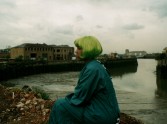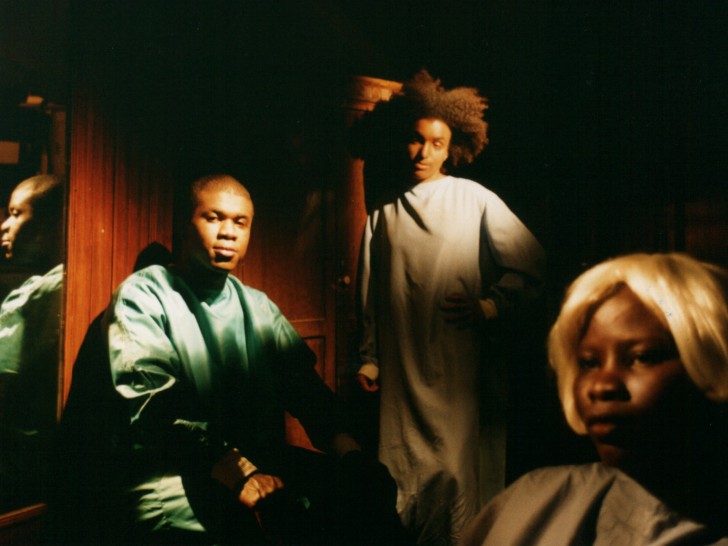
The Last Angel of History and Memory Room 451 introduction by David Pendleton. ©Harvard Film Archive
Transcript
John Quackenbush 0:01
March 8, 2014. The Harvard Film Archive screened The Last Angel of History and Memory Room 451. This is the recording of the audio introduction by HFA programmer David Pendleton.
David Pendleton 0:19
Good evening, folks. I'm David Pendleton, the programmer here at the Harvard Film Archive. And it's a great pleasure to welcome all of you to the first of three very special evenings here at the Archive devoted to the work of one of the greatest living English filmmakers, Mr. John Akomfrah. I'm here just to say a few words of introduction. First of all, to remind you to please turn off any devices that you might have on your person that might make noise or shed light. Please refrain from illuminating them during the program while the house lights are down. We're very grateful that we will have Mr. Akomfrah and his producer and partner Lina Gopaul here tomorrow night and Monday night. Tonight, we start sort of in medias res, as it were. John Akomfrah has been making work for over 30 years now. He was born into a Ghanaian family, who relocated to the UK when he was very young. And he really leapt to prominence with one of his very first films, Handsworth Songs, from the early 1980s, which we're showing tomorrow, back when he was one of the founding members of the Black Audio Film Collective in England. Part of, I think, a really fascinating wave of British filmmaking that arose, to some extent, as a reaction to Thatcherism. Akomfrah belongs to the same generation as filmmakers like Sally Potter, Isaac Julien, also around the same time that Derek Jarman was making a lot of his later work. What's really distinctive about Akomfrah’s work is his work within the essay film tradition. Akomfrah’s work is quite varied. He's a very prolific maker. And he's worked in a number of different genres, you might say. Everything from fiction feature films, to shorter experimental work, installation work, meant to be seen in galleries and museums. But much of his work is built around the idea of using the moving image as a way of making an argument. Making an argument, but also in a very poetic way. He works a lot with found footage, as you'll see, and a lot with text. He is a very skilled writer, as well. And what we're going to see tonight are two really great examples, I think, of Akomfrah working in the essay film mode, from the mid-1990s. Much of Akomfrah’s early work was on film but he also worked a great deal with video. And has, of course, made the transition to working with digital imagery more recently.
What you'll see are two films that are very closely linked, although they're also very different. And they are, in many ways, a good introduction to many of the different modes that John Akomfrah works in. The Last Angel of History is, in some ways, has a more pronounced basis in nonfiction, in documentary complete with interviews, and the use of archival footage. Whereas with Memory Room 451, what we'll see are actors. And we'll also see the poetic side of Akomfrah’s practice, and the poetic side of his text. And in many ways, actually, the latter film is itself an example of what John Akomfrah, one of the main things that John Akomfrah is exploring in the first film, in The Last Angel of History, this idea of black science fiction. The main, the recurring thematics of Akomfrah’s work are, of course, the black diasporic experience on both sides of the Atlantic, as well as a fascination with history. And the movement of African diaspora through history, the movement of history through the African diaspora. And that's something that we'll see in all of the work that we're going to see.
Monday night, what we'll watch is one of his most recent works, The Stuart Hall Project, a portrait of the great thinker, one of the founding figures in British cultural studies, who sadly passed away recently. And in a way, for a lot of people my age, it was through the work of Akomfrah and the Black Audio Film Collective that a lot of the ideas of British cultural studies, I think, really sort of came to life. So it'll be great to have him and Lina Gopaul here on Monday, talking about Stuart Hall. Please come back for that, and for tomorrow night's film.
And finally, it's really the MIT program in Art, Culture and Technology that's made this program possible. John Akomfrah and Lina Gopaul have been visiting artists there. They're finishing up a two-year residency. And yesterday marked the ending—there was a two-day symposium on Thursday and Friday called Cinematic Migrations, also built around their work. And I want to give a very special thanks to the person who really was at the origin of this project, the director of the MIT program in Art, Culture, and Technology, and an artist, writer and teacher, Renée Green is here. Please join me in thanking Renée Green. Renée.
[APPLAUSE]
You can stand up if you want to.
[APPLAUSE]
Alright. Enjoy the program, and come back.
©Harvard Film Archive
Related film series
Explore more conversations
Ramin Bahrani
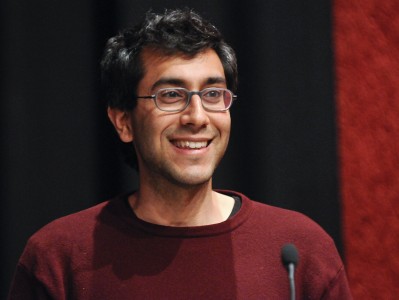
Kataoka Ichiro
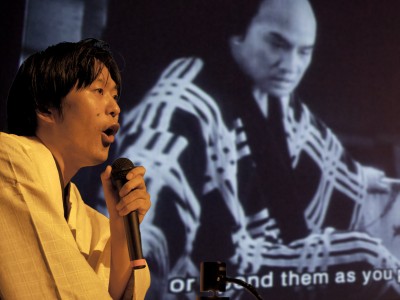
Daniel Hui
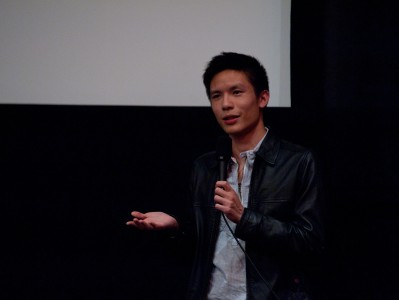
Alex Ross Perry


